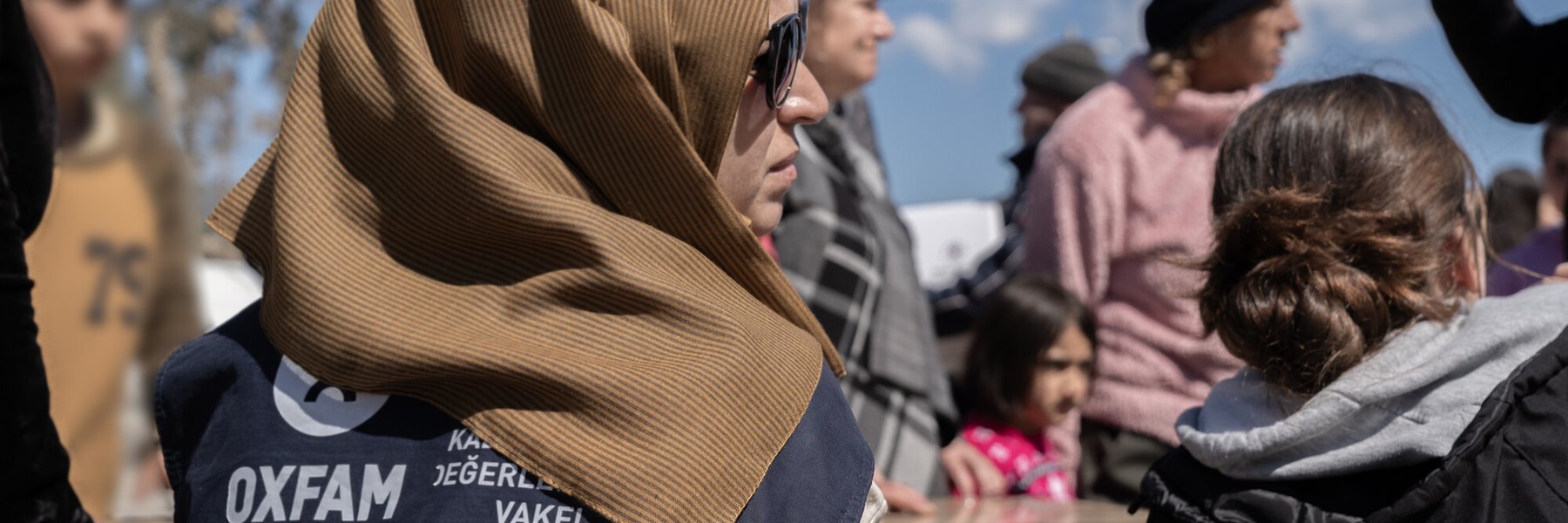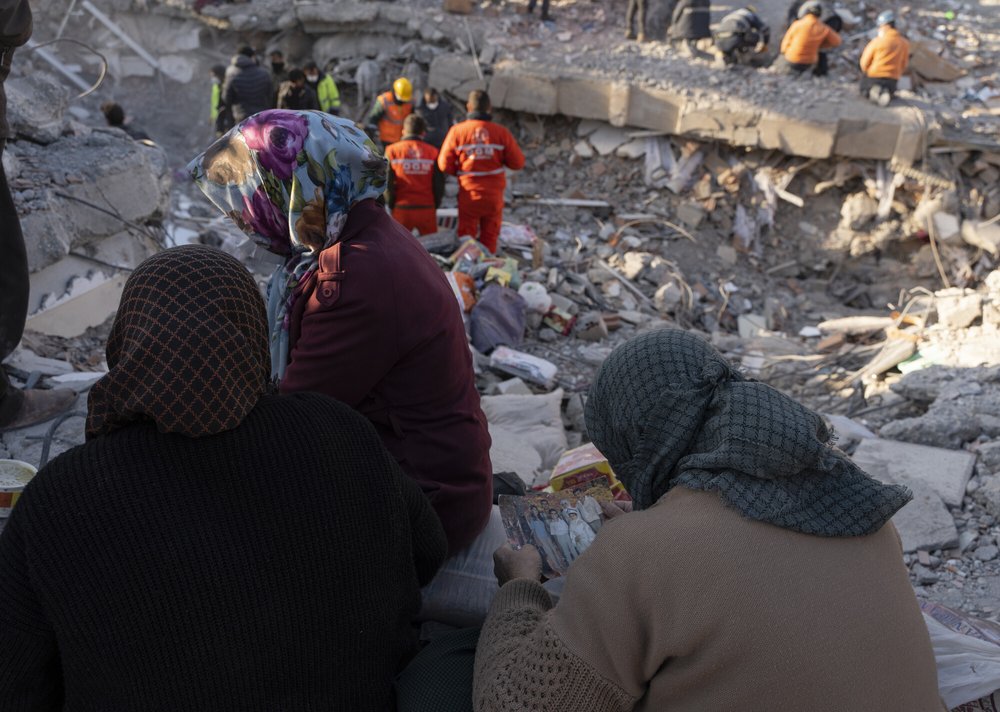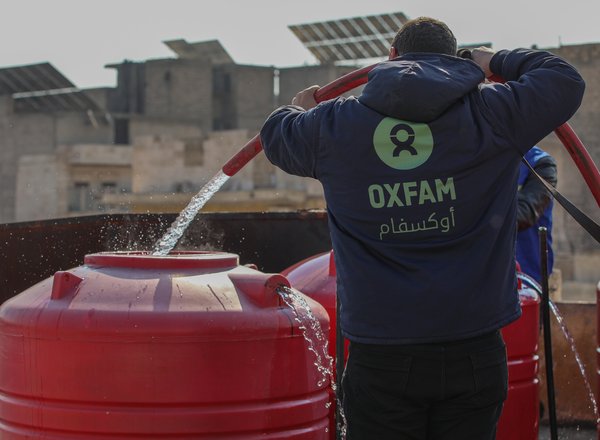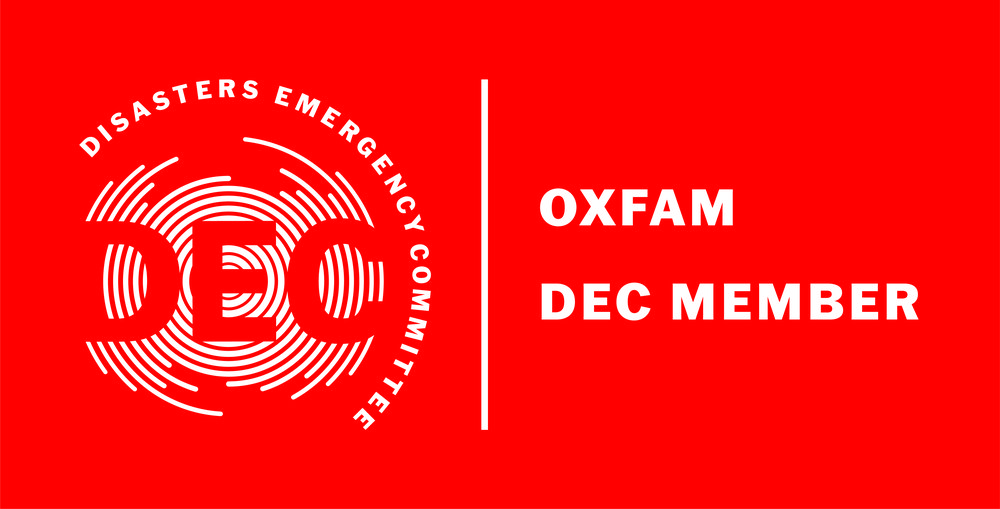"I show them love and they show me love in return. I try to help people feel safe." Buthayna works for Oxfam KEDV in the emergency response team. She's a Syrian refugee whose home in Türkiye was destroyed by the earthquake. Image: Mustafa Karali/Oxfam

Turkey-Syria Earthquake 2023
Last updated: 02 April 2025
"In February, in just a few minutes, my dream to build a house for my family was shattered by the earthquake. I thank God that I am strong.”
Buthanya Elfaris, who fled war in Syria in 2013, is working in the Oxfam KEDV emergency response team, in Türkiye.
Oxfam, together with local partner organisations, have been working with people affected by the 2023 earthquakes in Türkiye (Turkey) and Syria. Thank you for your support.
How you can support
-

Emergency food and shelter
Organisations based in Türkiye (Turkey) and Syria, with Oxfam KEDV, are supporting people displaced by the devastating earthquakes. Together, they've reached thousands of people with toilets, hygiene kits, food and cash assistance.
-

Community led recovery
Our local teams have the knowledge, experience and relationships to work with communities. Immediate survival is a priority, but we’ll start now to jointly plan the long, hard journey of rebuilding – because people can’t be left without protection when the next crisis comes.
“What people really need right now is a roof over their heads and emergency food supplies to feed their children.”
Dania Kareh, Oxfam Communications Officer, Syria
It’s hard for many of us to imagine the devastation from these earthquakes. Even harder in places impacted by ongoing conflict. But earthquake survivors are facing this as well as freezing weather and the cost of living crisis – with rising fuel and food prices. A fragile situation has been made even worse.
This calls on us, and those in power, to urgently stand with people fighting for the basics. People need food, water, shelter, and medical care without delay.
In Türkiye, Oxfam KEDV are leading our response. They have worked with both refugee and Turkish communities for years and will be reaching those worst-affected by this disaster. The Oxfam team in Syria are working with partners like Syrian Society for Social Development. In Aleppo, they’re working with partners in readiness to respond to people’s needs now, and in the coming weeks and months.
In the second week of the earthquake, women wait for their families to be found under the rubble, carrying family photos in their hands. Image: Yalcin Ciftci/Oxfam KEDV

What's happening in Türkiye (Turkey) and Syria
In the early hours of 6 February, a 7.8 magnitude earthquake hit Türkiye (Turkey) and Syria, followed by another earthquake soon afterwards. Many thousands of people have been killed. Survivors who have been forced to flee their homes are now facing freezing temperatures.
These are the worst earthquakes to strike Türkiye (Turkey) in nearly 100 years. They have devastated a region where large refugee communities were living in tough conditions. The severe and continuous shocks from the earthquakes have reached cities in Syria like Aleppo, Latakia, Hama and Idlib where the humanitarian need is at its highest since brutal conflict began 12 years ago.
Infrastructure is heavily damaged, and we know that means people will struggle to find safe shelter, water and food especially in places impacted by ongoing conflict. There’s been huge loss of life, thousands injured, and many more still buried in the debris. The harsh weather and damaged roads make rescue efforts challenging. And in Syria, a cholera outbreak that began last year could quickly get further out of control. There’s no time to waste.
Türkiye (Turkey) and Syria earthquake map. Image; Oxfam
The situation
Southern Türkiye (Turkey) has been heavily affected, especially areas around Gaziantep and Hatay/Antakya.
In Syria, the cities of Aleppo, Latakia, Hama and Idlib have been badly hit by the earthquake and severe aftershocks.
“The scale of destruction is vast. Following two big earthquakes and over 60 aftershocks, people are still in shock and fear, they don't even have time to mourn the lost ones.”
Meryem Aslan, Oxfam spokesperson in Ankara.
Impact of the latest earthquake
A new earthquake, two weeks after the first, has caused further physical damage and psychological trauma.
The epicentre was in one of Oxfam-KEDV’s working areas. We have heard from colleagues in the area that buildings that were in precarious positions before this most recent earthquake have collapsed. People have been killed, likely more than the official reported numbers.
Hospitals were evacuated as a precaution against a possible tsunami, which, thankfully, did not occur.
How Oxfam KEDV and partners are responding
Oxfam-KEDV partners and cooperatives continue to provide items to meet people's basic needs, and focus on those who are in more immediate need in the areas affected by the most recent earthquake and aftershocks. So far...
- Essential items including blankets, food kits, stoves, hygiene items and power banks have been distributed to affected families.
- Basic facilities such as toilets and showers for families living in temporary accommodation have been installed.
- Oxfam-KEDV’s network of women’s cooperatives across affected areas are preparing hot meals for their communities with food and cooking equipment with our support.
- Preparations are underway to fix a large water storage reservoir which serves a temporary accommodation centre for up to 30,000 people.
Inequality in a crisis
Social inequalities show up starkly in disasters, with the most marginalised worst hit. The earthquakes will have deepened risks already facing women, children, older people, LGBTQIA+ people, people with disabilities and people with refugee status – those often unseen, unheard, and most excluded from society.
And it’s the voices of communities affected which are too often ignored when dealing with a crisis. They know best about what’s needed – from survival to recovery, to speaking out against underlying causes that makes them so vulnerable when disaster strikes.
Oxfam KEDV and Oxfam in Syria have been working on gender inequality for years. With KEDV rooted in women’s movements, and the team in Syria having a strong gender justice team, this experience and focus is a vital part of our response.
Frequently asked questions
Can I donate items like clothing and blankets to help people in emergencies?
Clothes and blankets are among the many items we can sell in our shops here to raise funds, but Oxfam does not send clothes and blankets overseas, however good their condition.
Often this is not cost effective. Shipping also takes time. What people give today might not be what people need tomorrow. Wherever possible, Oxfam buys items locally or from countries in the affected region. This stimulates the local economy and has a lower environmental impact.
That's why making a cash donation is one of the most effective ways to support Oxfam's emergency work.
Can I volunteer to drive supplies from the UK overseas?
Oxfam does not send volunteer drivers from the UK overseas with supplies. Wherever possible, Oxfam buys items locally or from countries in the affected region. This stimulates the local economy and has a lower environmental impact.
That's why making a cash donation is one of the most effective ways to support Oxfam's emergency work.
We deeply appreciate anyone’s desire to support our work and would love for you to volunteer in one of our shops too. Our shop volunteers include those who have been forced to flee conflict and disaster, so they provide a way to welcome people in our communities.
Please visit our volunteering page to find out more information about the fantastic opportunities we have.
What is the DEC?
The Disasters Emergency Committee (DEC) is made up of 15 member charities, including Oxfam. When disaster strikes in a place that doesn't have the capacity to respond, the DEC brings together 15 UK charities to raise funds together fast.
All DEC member charities are experts in humanitarian aid. Each member specialises in different areas of disaster response. Together, united with one voice, the call for help can reach as many people like you as possible.
Oxfam delivering water to shelters in Aleppo city. Image: Islam Mardini/ Oxfam

Please donate what you can today
Oxfam Emergency Response
“The scale of destruction is vast. Following two big earthquakes and over 60 aftershocks, people are still in shock and fear.
Meryem Aslan, Oxfam spokesperson in Ankara.

Oxfam is a member of the Disasters Emergency Committee (DEC).
How we spend your money
For every £1 you donate to this emergency appeal, we will allocate 9p of your donation to cover general support and running costs. There is a small chance that we will raise more money than is needed for this appeal. If this happens, we'll spend any additional funds on other Oxfam projects – wherever the need is greatest.